Providence Heart Institute Philanthropy Report
Your gifts are advancing prevention, research and treatments for patients across the Pacific Northwest

Your gifts are advancing prevention, research and treatments for patients across the Pacific Northwest
Providence Heart Institute is the leading cardiovascular center in the nation’s fifth-largest not-for-profit health care system with exceptional clinical programs that care for more than 58,000 patients annually.
U.S. News & World Report
High-Performing for Aortic Valve Surgery
High-Performing for Heart Attack
High-Performing for Heart Bypass Surgery
High-Performing for Heart Failure
High-Performing for Transcatheter
Aortic Valve Replacement (TAVR)

International Cardio-Oncology Society
Center of Excellence Award
American Heart Association
Honor Roll award for improving care and treatment for aortic stenosis
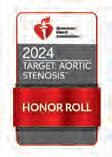
Dear friends and partners,
As I look back on the past year, I am proud to share how your support is advancing innovation, research and equity in heart care.
With your help, we have made significant strides toward developing an inpatient cardiac care hub so our excellent caregivers can best respond to the needs of every patient, now and in the future. These modernized facilities not only ensure faster care but offer improved comfort and privacy for patients and their families.
Your contributions have also propelled technologies that address advanced heart disease and have launched new specialty care, such as the Howard “H” White Center for Cardiac Amyloidosis. Our centers are accelerating access to diagnoses and treatments for people across the Pacific Northwest.
These efforts—and all our work—have been propelled by your generosity.
With gratitude,
Dan Oseran, M.D. Executive Medical Director Providence Heart Institute
“We are grateful for and humbled by your dedication to healing and preventing cardiac disease, now and for generations to come.”
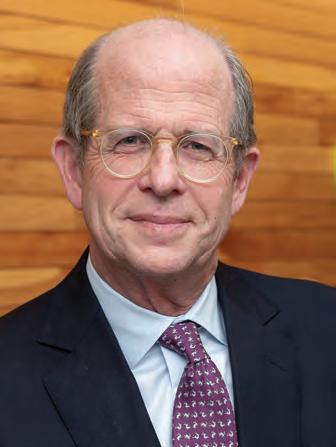
The Coes’ generosity is helping to build a better future for cardiac health by expanding access to care in and beyond Oregon.
Ken and Susan Coe made a life building homes and opening doors for families. Now, their gifts to Providence Heart Institute are opening doors for people seeking exceptional cardiac care.
“I like to help the helpers,” said Ken. “When I give to Providence, I can help hundreds of people.” Susan agreed, “Providence has been very good to us. We’re comfortable, so why not put our money to good use?”
The couple rose from humble beginnings. Susan came to Portland from Montana to teach elementary school. Ken grew up working in his family’s restaurant in tiny Clarkston, Washington. In Portland he got a job driving a milk truck. They married just months after meeting.
Always ambitious, Ken would not spend his life delivering milk. At a friend’s suggestion, he began to sell houses. Soon he was building them. Over time, he grew one of Washington County’s largest real estate development companies. He is quick to credit people who helped him: “As I worked myself up, I always met someone who opened a door or gave me a hand.”
Excellent care inspires the Coes to give back
Now the couple is lending a hand to others by giving to the heart institute, where Ken has been a patient for more than 10 years.
The Coes’ contribution to the Howard “H” White Center for Cardiac Amyloidosis will advance care for people like Ken who have this rare disease that is often misdiagnosed or missed entirely. Their other gifts are helping build a new cardiac intensive care unit (CICU) for Providence Heart Institute, as part of the Tomorrow Starts Today Campaign.
Andrea Orfanakis, M.D., medical director of the CICU, shared, “Gifts like Ken’s and Susan’s bring caregivers energy and excitement. The inspiration is invaluable.”

Ken Coe has been a Providence Heart Institute patient for more than 10 years. “I feel so grateful,” he said. “I tell people, ‘If something happens to me, no matter where I am, take me to Providence.’” Susan added, “What they’ve done for us has been amazing. You just want to pay it forward.”
life so he gave to cardiac research to help others
Ed Foehl and his wife, Katie, established the Dr. Eric Kirker Fund at Providence Heart Institute in 2017 to support cardiovascular surgery research. Eric Kirker, M.D., was Ed’s cardiovascular surgeon.
A West Point graduate, Ed was highly decorated for his service in Vietnam and went on to have a distinguished business career. A self-professed “army brat,” Katie met Ed while working at the National Institutes of Health. She served on Providence Portland Medical Foundation’s board and Providence Heart Institute’s leadership cabinet.
The couple continued to give over the years and through their estate, growing the fund to $3 million. Katie died in 2022 after a long battle with cancer. Ed passed in 2024.
“Ed and Katie believed strongly in Dr. Kirker’s research efforts and outstanding results,” said longtime friend, Mark Van Heuvel. “They were inspirational to the many people whose lives they touched.”
The fund allowed Dr. Kirker to publish research establishing the safety and efficacy of a novel approach for replacing heart valves through a catheter in the carotid artery, which led to widespread adoption. The fund also helped Dr. Kirker publish research that documented the effectiveness of using temporary mechanical circulatory assist devices to treat life-threatening complications from heart attacks and heart failure and the use of custom-made stents to repair the aorta.
“When I operate, I help one patient at a time. When I publish, my research can help thousands of patients. Ed and Katie’s legacy will exponentially increase the number of lives saved.”
--Eric Kirker, M.D.
“Ed and Katie were genuine friends who believed in giving back and advancing care for others less fortunate,” said Dr. Kirker. “Having their support has been both humbling and empowering.”
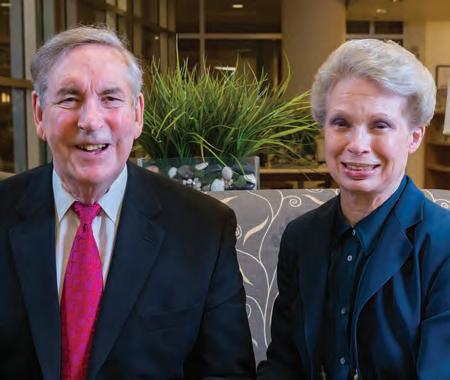
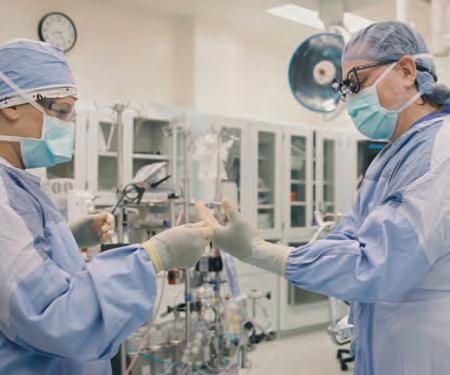
Eric Kirker, M.D., preparing for cardiovascular surgery (bottom).
Howard “H” White is pictured with his longtime friend Michael Jordan. Together, their leadership investments in the center are powering innovation in cardiac amyloidosis detection and care.
Howard “H” White developed congestive heart failure in 2017 and was diagnosed by cardiologists at Providence Heart Institute with cardiac amyloidosis – an underdiagnosed disease in which abnormal proteins deposit in the heart. These proteins reduce the heart’s pumping capacity or disrupt the heart’s rhythm, and sometimes do both. Now, when caught early, cardiac amyloidosis can be treated. But for Howard, his symptoms worsened, requiring a heart transplant in late 2020. Four years later, he chose to give back.
Spurring change through philanthropy
Howard is renowned for his basketball acumen, his leadership at NIKE, Inc. and his role as an advisor to NBA legend Michael Jordan. Now he’s also helping change lives.
The center that bears his name is primarily funded through philanthropy. Howard’s leadership gift, a generous $1 million gift from Michael Jordan and additional donations are propelling advancements in care. Other early supporters were actor Chris Tucker, who played Howard in the movie “Air”; rapper Ludacris; NIKE leadership, including Mark Parker; former NIKE CEO John Donahoe; patients and many others.

“I believe this center will save more lives, help more people avoid having a heart transplant like I did. And I’m both humbled and inspired by the friends who are joining in to help Providence make this belief a reality,” Howard said.
When support for the center and its naming were made public in fall 2024, it garnered regional and national attention. The story was picked up by every Portland television station; written about in The Oregonian, Portland Business Journal and Portland Tribune; and published by Newsweek and MSN. This coverage led to further interest and support, fulfilling Michael Jordan’s hope that his gift would inspire others.
“We have no idea who we’re helping when we give. It’s the idea of healing, of believing there’s something in the world that’s bigger than all of us.”
--Howard “H’ White
Because the symptoms of amyloidosis overlap with common conditions, such as high blood pressure, the diagnosis is frequently delayed or missed entirely, particularly among African Americans. The Howard “H” White Center aims to change that.
Providence cardiologists, Jenna Kay, M.D., medical director of the Howard “H” White Center, and Jacob Abraham, M.D., section head of advanced heart failure, are collaborating with other large health systems on using artificial intelligence to screen echocardiograms to identify patients at risk for amyloidosis who warrant further testing.
It is through the Howard “H” White Center that patients will receive extensive screenings for amyloidosis, and, if necessary, treatment plans, which can include medications, participation in clinical trials and, in some cases, heart transplantation.
“Because of Providence’s far-reaching clinical footprint, we can apply innovative algorithms across a significant amount of data. The lifesaving potential of this work is very real,” said Dr. Abraham.
Dr. Kay added, “I’m inspired every day by the patients we get to serve, the opportunities we have to reach more people, and by the incredible generosity making this all possible.”
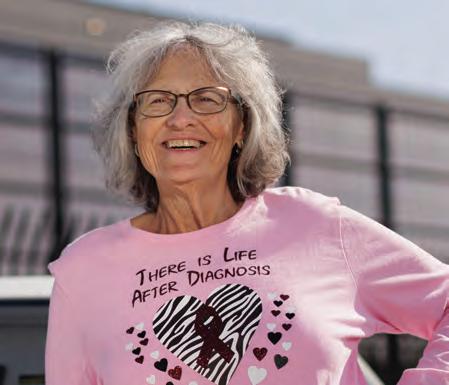
Sue Dalzell is one of 11,000 patients each year who travel to Providence Heart Institute from outside of Portland for complex cardiac care. She regularly makes the 160-mile trip from rural Condon, Oregon, to what is now the Howard “H” White Center for Cardiac Amyloidosis.
In fact, three generations of Sue’s family have been receiving care at Providence for the genetic heart condition.
“When you’ve been going to the same place for all these years and have seen how the doctors and nurses treat their patients, you wouldn’t go anywhere else,” said Sue.
The reach of Basecamp Prevention + Wellness, which is part of Providence Heart Institute, has steadily grown since the program’s inception eight years ago. The program now serves communities not only across the Providence system but also across the globe. And with the support of donors like you, the team is focused on reaching new audiences, including vulnerable populations.
In the last year alone, prevention and wellness programming, which offers in-person and virtual opportunities, grew by 50%. Basecamp now has nearly 20,000 subscribers who can access free classes and resources that support a heart-healthy lifestyle; and Heart to Start, an inclusive 5K training program, reached an all-time high of 3,500 participants.
Paying it forward
Manny Manahan discovered Basecamp‘s community center after his open-heart surgery in 2019. As part of his recovery, Manny’s surgeon, Gary Ott, M.D., recommended he complete Providencerun cardiac rehabilitation classes, which are held in the same building as Basecamp. He did so until the pandemic hit. Once activities resumed, he signed up for some of the classes offered at Basecamp’s community center.
“The
rehabilitation classes
taught
me
to pay attention to my heart. Basecamp’s programs conditioned my mind to stay healthy and fit.”
--Manny Manahan
Manny now regularly kickboxes and jumps rope. “I can do 120 jumps without stopping, which motivated my siblings to take up the activity,” he added.
These experiences inspired him to give back as a volunteer. Since the summer of 2024, Manny has served as one of the volunteers who welcomes people when they enter the building. He finds joy in helping people get to appointments, free community classes and rehabilitation programs. “When patients find out that I’ve been in their shoes,” Manny said, “it offers them hope.”
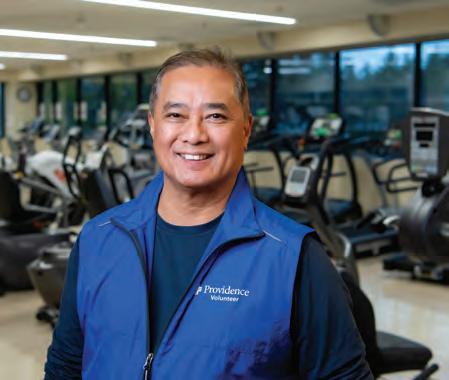
“I believe in Basecamp’s programs,” said Manny Manahan. He chose to become a volunteer at the center after others supported him during his cardiac surgery, rehabilitation and wellness journey.
Manny is photographed in the cardiac rehabilitation room at Providence St. Vincent Medical Center.
The Center for Cardiovascular Analytics, Research + Data Science (CARDS) is tackling health equity while seeking to improve patient outcomes.
With your support, the CARDS team is conducting research that is improving parity in health care.
Mary Imboden, Ph.D., is exploring drivers of cardiovascular health disparities. One of her studies is evaluating differences in timely emergency care between male and female patients having acute heart attacks. A study by Kateri Spinelli, Ph.D., examined prescription rates in the U.S. for GLP-1 receptor agonists, such as Ozempic, which help lower blood sugar levels, promote weight loss and reduce heart disease risks. Unique patterns were found that, in part, were related to race and socioeconomic status, highlighting the need for underserved communities to have improved access to care.
And, Ty Gluckman, M.D., MHA, FACC, FAHA, FASPC, medical director of CARDS, is helping to identify care gaps among patients with heart failure, atherosclerotic disease and atrial fibrillation as part of quality improvement.
CARDS is also prioritizing the use of artificial intelligence to improve care delivery. Using machine learning, Dr. Spinelli and the CARDS data team identified subgroups of heart failure patients with distinct social and economic needs, which adversely impact their health. These findings emphasize how new care approaches could alleviate these challenges.
Clinical trial makes an immediate difference
LeRoy Main’s enlarged and weakened heart left him exhausted walking between his kitchen and living room. Wanting to see his grandchildren start school, he enrolled in a clinical trial recommended by Jacob Abraham, M.D., his heart failure specialist. Through the trial, a catheter was inserted into an artery in LeRoy’s leg to place a device in his heart. This ring-shaped device cinches the heart to make it smaller and pump more efficiently. “I immediately felt improvements in my breathing and walking,” LeRoy said. “I’m utterly grateful.”


“Data allows us to find out why care gaps exist and how to better address them,” said Ty Gluckman, M.D., medical director of CARDS (top).
”I’m alive and kicking because of this trial,” said LeRoy. “I thought I wouldn’t see my grandchildren go to kindergarten, and they’re five in a few months” (bottom).

A dedicated lounge will offer caregivers a comfortable place to decompress and help them perform at their best.
Generous support from donors is bringing us closer to re-imagining cardiac care through the Tomorrow Starts Today Campaign. Every space is being transformed to meet the growing number of patients with increasingly complex heart conditions.
Because of your gifts, $52 million has been raised toward our $62 million philanthropic goal for this pillar of the campaign.
This funding is part of an $85 million investment in Providence Heart Institute. Patients and caregivers of both today and 50 years from now will benefit from state-of-the-art cardiac facilities co-located on one floor of Providence St. Vincent Medical Center.
With your generosity, we finalized architectural designs for every space within this cardiac care hub and began moving our administrative offices to make room for these new facilities.
The new cardiac care hub design will:
Provide ample space
Larger rooms will mean more comfort for patients and families.
Speed response
Rooms with more square footage will accommodate the latest technology and will allow better access to patients in emergencies.
Improve monitoring
Improved sightlines will ensure caregivers can directly see patients and monitor their progress.
Recruit and retain staff
Dedicated respite areas will reduce burnout and improve overall care.
Increase capacity
The redesign will add 16 intensive care beds to the hospital’s overall capacity.
Improve outcomes
The new CICU will help Providence Heart Institute remain a premier heart health center.
Charting and observation stations next to patient rooms, as well as direct viewing windows will allow nursing teams to provide patients with continous care.
Thanks to you, we’re ready for the next step
These efforts pave the way for the first phase of construction to begin this spring, starting with a new interventional recovery unit. This unit will support patients who need to prepare for and recuperate from minimally invasive procedures.
Also scheduled to be built in 2025 are new, modernized electrophysiology labs, which will be placed in proximity to other procedure rooms, allowing for closer collaboration among caregivers and faster results for patients. These changes are the first steps toward expanding access to innovative and excellent cardiac care for people across the Pacific Northwest.

Each patient room in the CICU will have natural light, a private bathroom and a family area with a recliner chair and sleeper sofa. The space is also designed to accommodate the latest technology to ensure patients have the very best care.

Central care team stations will be located at each quadrant within the cardiac care hub, placing caregivers within steps of patients.
